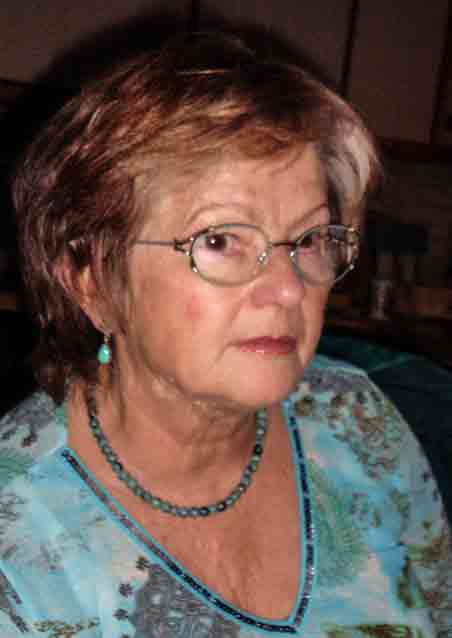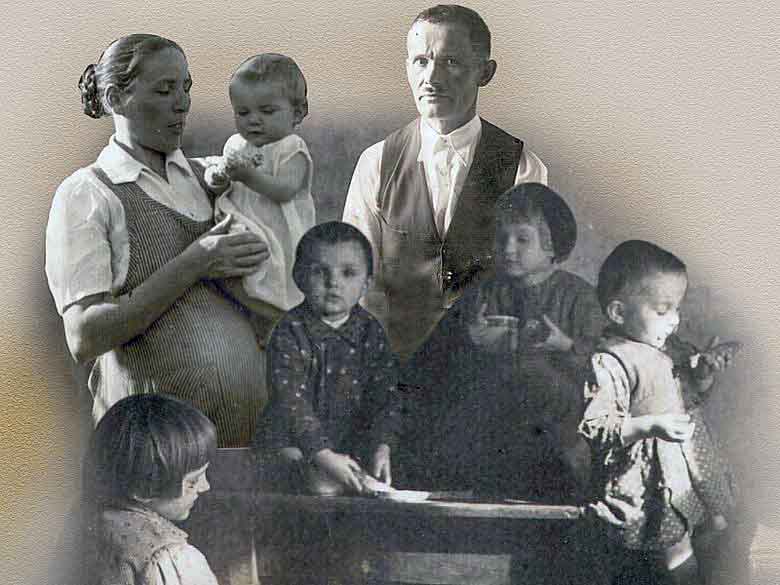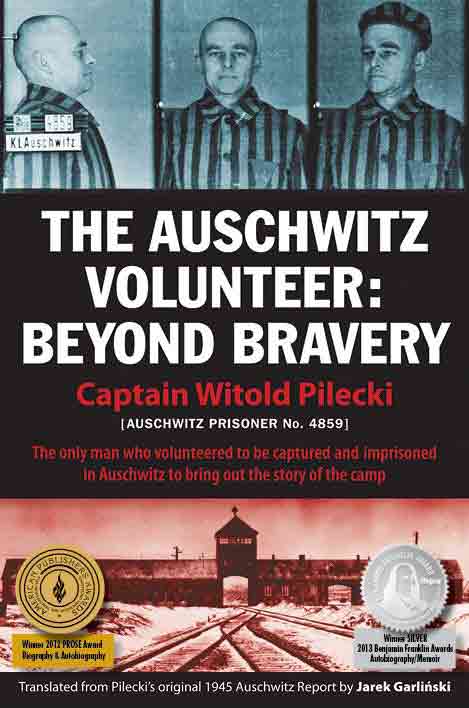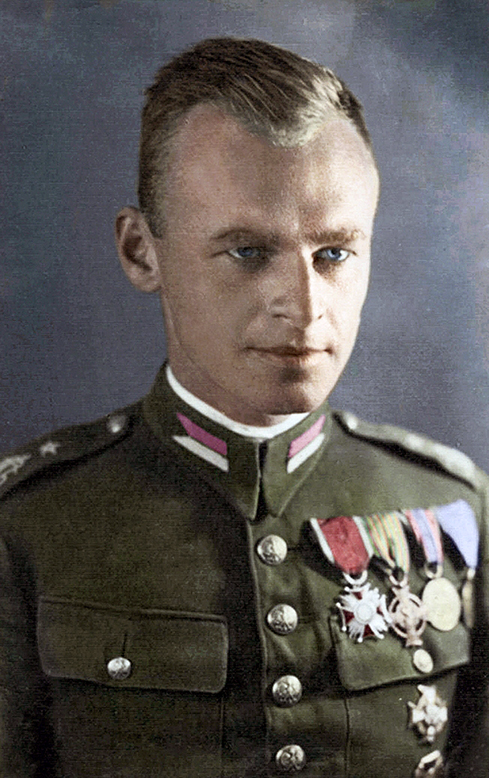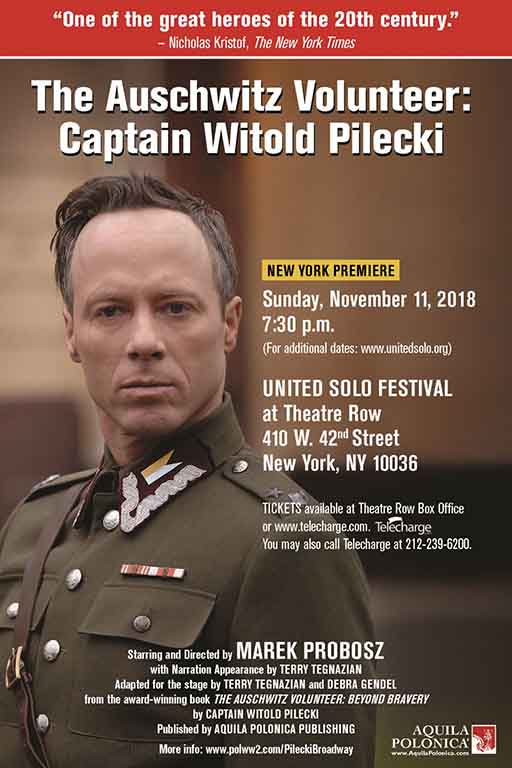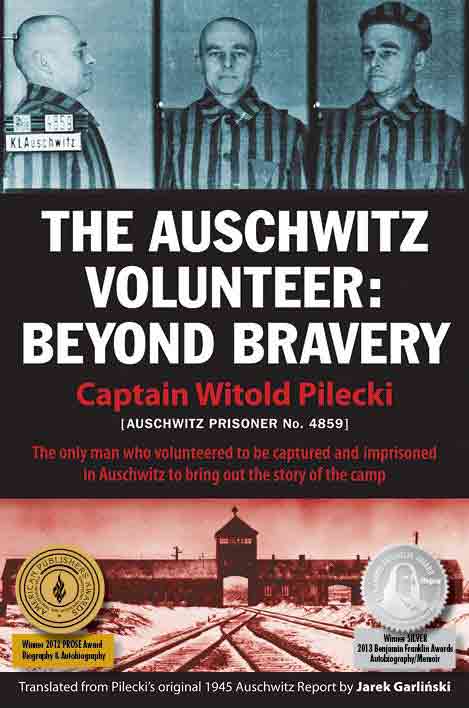May 25 this year is the 74th anniversary of the death of Captain Pilecki in the Mokotów prison.
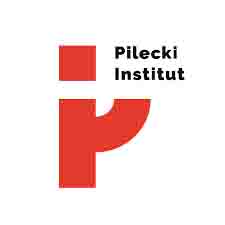
Logo of the Pilecki Institute (Source: Wikipedia.de)
Poles living in Germany welcomed the news about the establishment of a branch of the Witold Pilecki Institute in Berlin with satisfaction. None of us living here had any doubts about the necessity to create such an institution.
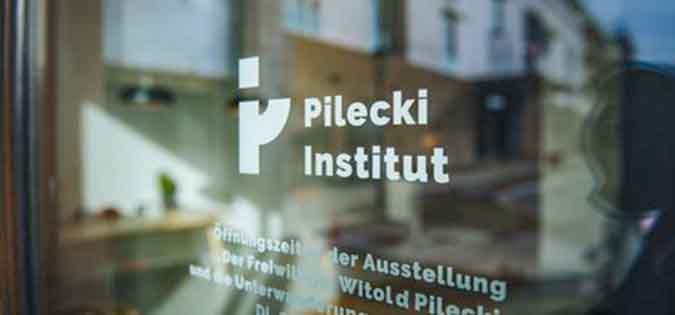
Pilecki-Institut, Berlin (Source: Wikipedia.de)
Director Hanna Radziejowska in the interview "Germany knows almost nothing about the history of Poland" (Polnische Geschichte: Die Deutschen wissen fast nichts), conducted in the Spiegel newspaper on April 30 this year, stated:
Knowledge of the history of the 20th century in Eastern Europe, as well as of art and culture, is very low in Germany. (...) The interested public remembers France and the German occupation of this country, but does not remember the Nazi regime in Poland.
Professor Dieter Bingen — former director of the Polish Institute in Darmstadt — speaks in this case about "gaps in German memory".
It is high time to finally fill these "gaps". This is the purpose of the Witold Pilecki Institute with its branch in Berlin. It was located in September 2019 on one of the most recognizable, symbolic places of this city — next to the Brandenburg Gate, at Pariser Platz 4 A.
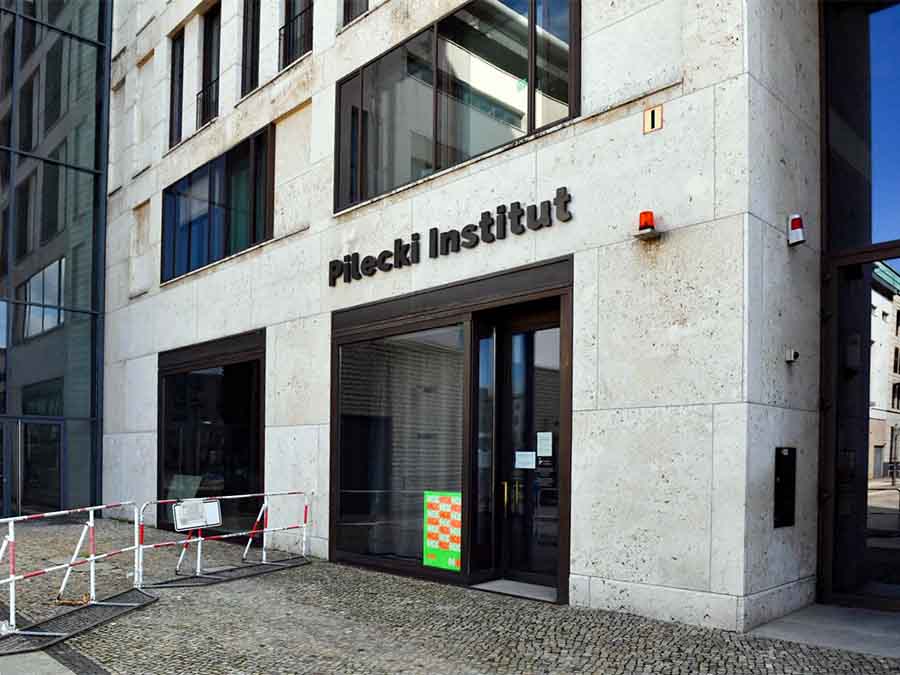
The Pilecki Institute (Source: Wikipedia.de)
The Pilecki Institute, with a branch in Berlin, is an international research institution dealing with the history of 20th-century Poland and its interpretation. In this way, he wants to contribute to the deepening of knowledge about the fate of our country among German society. The aim of the Institute's work is to show the social, historical and cultural changes in Europe, with particular emphasis on the processes of change in Poland, Central and Eastern Europe as well as the norms and values related to the pan-European experiences of the 20th century.
The activity of this first foreign branch of the Witold Pilecki Institute was inaugurated with the opening of an exhibition about Captain Pilecki. The curator is the director Hanna Radziejowska. The exhibition was opened on September 17, 2019. This date was chosen not by accident. It was this day, on September 17, 1939, that started the period of Soviet occupation for our nation, which lasted almost half a century. This is the second, after September 1, date of the commencement of World War II, which is the beginning of cooperation between the two totalitarian systems against which the Poles fought, against whom Captain Pilecki fought.
The first permanent exhibition of the Institute, based on the latest research, shows the history of Witold Pilecki's struggle for sovereign Poland and his volunteer mission in Auschwitz.
The director of the Institute, Hanna Radziejowska, believes that
Witold Pilecki was chosen as the patron of the inaugural event not only as the patron of the institution, but also as a universal, understandable in the West symbol of the struggle against both totalitarianisms, the Nazi and the communist ones, whose remarkable history is the personification of Poland's fate in the 20th century. .
The choice of the hero is also related to the success of the recently published in the US and UK book about Pilecki entitled "The Volunteer" by the British-American war correspondent Jacek Fairweather, who is also, together with Hanna Radziejowska, the curator of the Berlin exhibition.
The exhibition about the Captain was prepared with the participation of experts: prof. Jochen Boehler from the University of Jena and Dr. Piotr Setkiewicz from the Auschwitz Museum. The exhibition tells the story of Pilecki using not only his reports, but also unique objects, such as a copy of the Enigma encryption machine, photographs of fragments of the Grand Theater in Warsaw destroyed by the Germans, unknown documents from the Auschwitz trials in Frankfurt, or a number of original exhibits from the Auschwitz Museum.
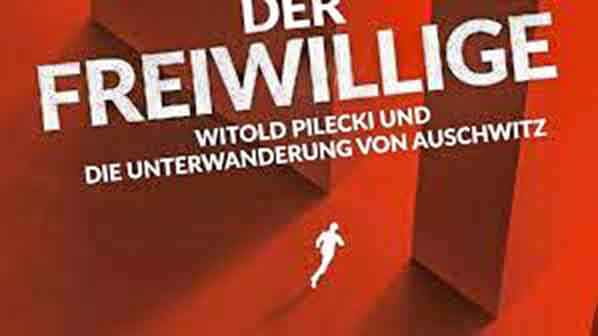
"Der Freiwillige — Volunteer Witold Pilecki and his mission in Auschwitz" (pileckiinstitut.de)
The exhibition is constantly updated, not only factual changes occur, but stylistic also, with a tendency to clarify and shorten statements. This exhibition is an example of removing "white patches" about the fate of Witold Pilecki, who was previously unknown in Germany.
President Andrzej Duda sent a congratulatory letter to the opening ceremony, in which he states:
Pilecki should be a model of a freedom fighter known to the whole world "(...) I trust that thanks to this exhibition (...) Polish recent history and our experience of the 20th century will be better known and understood by our partners in Germany and throughout Western Europe .
The Prime Minister of the Republic of Poland, Mateusz Morawiecki, assessed that
Thanks to the exhibition, our neighbors will be able to learn about the history of Witold Pilecki and better understand Poland, marked by the epoch of both totalitarianisms.
The head of the parliament of the state of Berlin Ralf Wieland said at the opening of the exhibition:
There are many heroes in Europe, and Witold Pilecki certainly belongs to them "(...). The Germans caused a lot of harm to Europe and caused Poland to suffer a lot of suffering. 80 years after the start of World War II, it is our duty to remember that it is there was not only war, it was also the racist madness of the Germans, something that made the world go off the track of civilization and in the face of the suffering that the Germans caused to the Polish nation it seems almost a miracle today that you can take part in the opening of such an exhibition.
There is also a digital archive at the Institute, which enriches the European collective consciousness. Its collections include digitized documents from all over the world, including Polish and German archives. The digital copies created by these archives are made available to the Pilecki Institute in Warsaw for general use in accordance with the conditions specified in the Federal Archive Act. At the same time, Porta Polonica in Bochum collected and digitized all traces of Polishness, especially from the nineteenth and early twentieth centuries. The objects of interest and the digitization of materials at the Pilecki Institute are documents of Polish presence under the control of both totalitarianisms.
The topics and forms of activity are varied. Some of them are:
- Workshops for Polish-speaking children from Berlin.
- Online training for secondary school teachers from all over Germany, for example, "Were the Allies supposed to bomb the Auschwitz concentration camp? Testimony of Witold Pilecki”. This form of information transfer, limited at the beginning by COVID restrictions, found such a strong response among teachers that it was decided to continue and develop it in the form of a video conference.
- "Open Door Days" — currently there is the third edition of this program, which serves as well as the previous one to supplement teachers' knowledge about Poland and its history.
- Online workshops for German students, for example: "Resistance to Nazi Crimes. Reports by Witold Pilecki from Auschwitz".
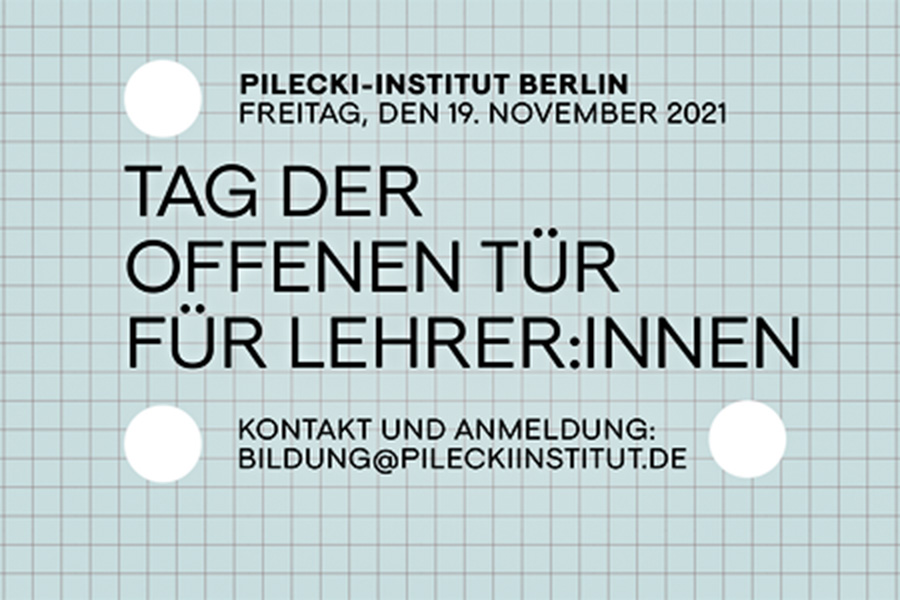
"Day of open days for teachers" (pileckiinstitut.de)
When it comes to "open days", Hanna Radziejowska, director of the Pilecki Institute, said about this form of teacher education:
German teachers are very interested. (...) Teachers from all over Germany come to our online seminars about Polish history, which is not well known in Germany, it is an undoubted success.
Alexander Kliymuk, a historian, an employee of the Institute, in an interview with PAP (April 13, 21) summarizes the results of activities aimed at educating teachers:
German teachers appreciate not only the interesting subject matter of the classes, but also their professional preparation, which facilitates their future work pedagogical. (..) Teachers receive ready-to-use lesson plans, sources and materials.
Students' reactions to the workshops are also very positive; it is "something new" for them. Here are some of the statements:
The workshops were very informative for me. Some things I already knew from history lessons, but I learned many new things about Auschwitz.
I didn't know anything about Pilecki before, so it was very interesting.
What touched me the most today is the story of Pilecki's life. The scary thing is that, despite his heroic deeds, he died at the hands of his own countrymen, who even tried to cover up his deed
I am shocked that the people who stood up for the country were executed. I admire Pilecki's mission.
The students understood well the geopolitical position of our country at a time when the Germans could develop freely after the end of the war and that there were Poles like Pilecki, for whom their own lives meant less than the need to fight two totalitarianisms: fascist and communist.
The above statements raise hope that the efforts of the Institute are not in vain, that the young generation of Germans needs such knowledge about Poland and that they are trying to understand what this "double occupation of Polish lands", this "double totalitarianism" consisted of.
This inspired the Institute to organize further workshops and identify optimization opportunities. "That is why we do not even think about resting on our laurels, but are constantly refining details, testing new tools and developing innovative Internet solutions," said the director of the Berlin Institute.
Among other projects organized by the Institute, the following should be mentioned:
- Lectures, the topics of which, one could say, "life itself dictates", e.g., "Geography of Hunger: the Holodomor on the map" by prof. Serhii Płochii. They are the result of discussions and the current needs of the present day. They have one thing in common: their goal is to fill the gaps in knowledge about Poland among the German community.
- Exhibitions — the current one is: “Lemkin. Witness to the Age of Genocide "about a Pole of Jewish descent, who was one of the greatest lawyers of the 20th century and the creator of the legal term" genocide ". The next exhibition will be "About the scout post in the Warsaw Uprising". Its aim is to show the Germans the heroism of Polish youth in the fight against the Nazi invaders. It will run from March this year to September 2022.
- Scholarships: The Institute awards grants to scientists, cultural workers and social activists for the implementation of research and cultural projects on the history of the 20th century. In 2021, scholarships were awarded to Belarusian scientists and students related to current events in their country.
- Publishing activity: The subject of the books published, which can be purchased in the institution's online store, is very diverse, such as Jerzy Rohoziński "Pioneers in the steppes? Kazakh Poles as part of the Soviet modernization project". In December 2019, the Pilecki Institute published the Ładoś List in Polish. The English version, the premiere of which was organized jointly with the World Jewish Congress, took place in London on February 24, 2020. The promotional tour covered New York and Connecticut.
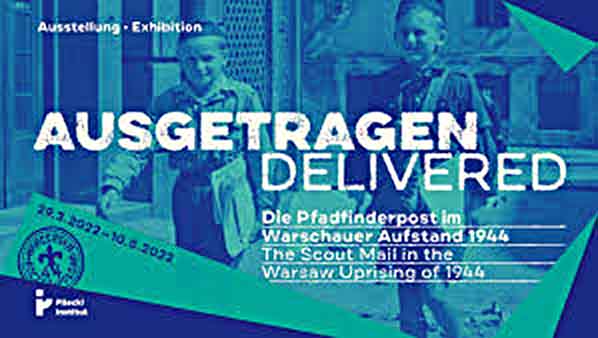
"Scout Field Mail at the Home Army during the Warsaw Uprising" (from the collection of the W. Pilecki Institute)
A short review of the topics and scope of the Institute's activities allows us to state that already in this short period of time it managed to awaken in German society the need for a deeper understanding of the fate of Poland, and that the Institute fulfills the mission of reducing "blind spots" in the knowledge of our country's history. This is confirmed by two statements from the circles of German scientific life. Prof. Peter Oliver Loew, head of the German-Polish Institute in Darmstadt, a specialist in Polish-German relations, said
Two societies that are as closely intertwined as Polish and German will only be able to communicate if they reflect together and remember what was different between these societies in the past.
Tanja Schult, a German-Swedish art researcher pointed out that
It is amazing how little we actually know. I understood this only when I started dealing with Poland and the Holocaust. I found out what we did not know about German crimes in Poland. The Germans must realize what they did in Poland, they murdered 1/5 of the Polish population. This does not exist in the European consciousness.
Unfortunately, these "blind spots" exist in the European consciousness.
A great "blank spot" in German consciousness (and not only) is the attitude of Poles towards Jews during the Nazi occupation. Poland needs an explanation of this problem all the more now that the book by Barbara Engelking and Jan Grabowski, "Night Without End", described by P. Gontarczyk as "a work on the verge of scientific mystification", translated into German, did not result in an unequivocal position of German media and historians. On the contrary, there is talk of cooperation "with the Polish police, the volunteer fire brigade, and often also with the civilian population."
In order to consistently eliminate the "blind spots" — after the success of the exhibition about Captain Pilecki — the Institute developed an exhibition and a second program, intended for teachers, focusing on the activities of the Ładoś Group and the efforts of diplomats saving Jews during the Holocaust: "Ładoś List, lecture and discussion in Polish, German and English ".

From the exhibition "Ładoś List" — the oldest passport "(Source: Wikipedia.de)
The President of the Republic of Poland, Andrzej Duda, said about this exhibition:
I am glad that people from all over the world will be able to see this great story and hear about those People who until now were really silent heroes in the fight for human life and human dignity.
It is time to find out about the above also in the USA and for a branch of the Witold Pilecki Institute to be established there as well.
Pilecki Institute Berlin:
+49 (0) 3027578955
E-Mail: bildung@pileckiinstitut.de
pileckiinstitut.de
Pariser Platz 4A, 10117 Berlin
About the fact that at the Warsaw Institute of Solidarity and Bravery Witold Pilecki. His work is protected from oblivion — needless to say. But the fact that in the public forum his bravery and heroic death sounds loud during the years of our country's sovereignty, it is worth mentioning. An example of this may be the poem and song by the author and performer of "Ballad about Captain Pilecki" by Lech Makowiecki. Here is an excerpt:
Captain Pilecki — as hard as steel,
Hitler did not crush you, Stalin was afraid of you ... (...)
Hey, Hey, Captain! You did not let death get you,
You descended to Auschwitz, You escaped from Auschwitz... "
Translated from Polish by Andrew Woźniewicz.



 auf Deutch
auf Deutch
